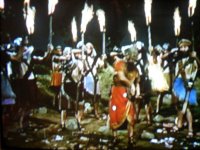 It's strange that Gideon has fared so poorly in the cinema. Samson, the other major hero from the book of Judges, has featured in more films than any other biblical character, except for Jesus. Whilst it could be argued that Samson's story is given the most space in Judges, the word count of these stories is hardly in proportion to the number of film portrayals. Arguments from the structure of Judges are no more conclusive. Judges is bookended by a prologue (1:1-3:6) and an epilogue (17:1-21:25). In between the exploits of the various judges are recounted. Whilst it could be argued that, in coming last, Samson's story forms the climax of this main section, most commentators observe a chiastic structure in Judges, with the story of Gideon being of central importance. Whilst both stories feature well in Sunday schools, I suspect the reason that Samson is the more popular when it comes to dramatising the story is simply because of the love angle and the absence of any female characters in Gideon's story.
It's strange that Gideon has fared so poorly in the cinema. Samson, the other major hero from the book of Judges, has featured in more films than any other biblical character, except for Jesus. Whilst it could be argued that Samson's story is given the most space in Judges, the word count of these stories is hardly in proportion to the number of film portrayals. Arguments from the structure of Judges are no more conclusive. Judges is bookended by a prologue (1:1-3:6) and an epilogue (17:1-21:25). In between the exploits of the various judges are recounted. Whilst it could be argued that, in coming last, Samson's story forms the climax of this main section, most commentators observe a chiastic structure in Judges, with the story of Gideon being of central importance. Whilst both stories feature well in Sunday schools, I suspect the reason that Samson is the more popular when it comes to dramatising the story is simply because of the love angle and the absence of any female characters in Gideon's story.Gideon: The Liberator, however, is something of a halfway house between the two, being essentially a dramatised Sunday School story. Produced by Concordia / Family Films productions, it's mere 14 minutes of screen time suggests the story is being disseminated for those with shorter attention spans. Add to this that the battle, and subsequent rout of the Midianites is all off screen, and it's clear where the film is aiming.
Up until the battle scenes the story shows remarkable faithfulness to the text. A prophet delivers an oracle, and shortly afterwards an angel finds Gideon in a winepress, and commissions him, staying around only long enough to light Gideon's sacrifice. Gideon then destroys the altar to Baal, but is protected by his father's speech. Gideon lays out his fleeces, gathers and selects his army before creeping in to the Midianite camp to hear a soldiers dream and it's interpretation. The pre-battle sequence concludes with the army lighting their torches, hiding them under their lamps, and smashing them on the top of the hill as they run toward the Midianite camp.
 The film then cuts to a very brief report of Gideon's army moping up the fleeing Midianites, with no mentions of the dispute with the Ephraimites, and the vengance taken against Succoth and Peniel. The final scene is Gideon, who has suddenly gone grey (the sign of being distinguished and wise) with his arm around his son (presumably Abimelech) refusing the kingship that is offered to him. No mention is made of the collection he requests, or the idol he makes as a result. Given that many, particularly those who consider Judges' structure to be chiastic, consider this incident to epitomise the whole book and be it's pivotal point, this omission is disappointing - if not entirely surprising.
The film then cuts to a very brief report of Gideon's army moping up the fleeing Midianites, with no mentions of the dispute with the Ephraimites, and the vengance taken against Succoth and Peniel. The final scene is Gideon, who has suddenly gone grey (the sign of being distinguished and wise) with his arm around his son (presumably Abimelech) refusing the kingship that is offered to him. No mention is made of the collection he requests, or the idol he makes as a result. Given that many, particularly those who consider Judges' structure to be chiastic, consider this incident to epitomise the whole book and be it's pivotal point, this omission is disappointing - if not entirely surprising.It's a long time bug bear of mine, but I do dislike it when people make films about the three dimensional humans of the bible that God uses inspite of their weaknesses, and reduces them to one dimensional robotically obedient heroes - removing their humanity in an attempt to portray them more reverently. Whilst the story doesn't completely ignore the fact that Gideon was basically killing his enemies, it does seem to consider that a bit of a tangent from what this film sees as a story about how to follow God. When the biblical narrative diverges from that agenda, rather than that shaping "the agenda" it is truncated, sweeping such nuances and reality under the carpet. But as I said above this is just a Sunday School type of film that's 14 minutes long.
Gideon: The Liberator was written by Betty Luerssen and directed by Edward Dew. Dew directed several episodes from the series, and had starred in almost 100 films in the forties and fifties, including brief appearances in The Adventures of Robin Hood and Citizen Kane.
Matt
No comments:
Post a Comment